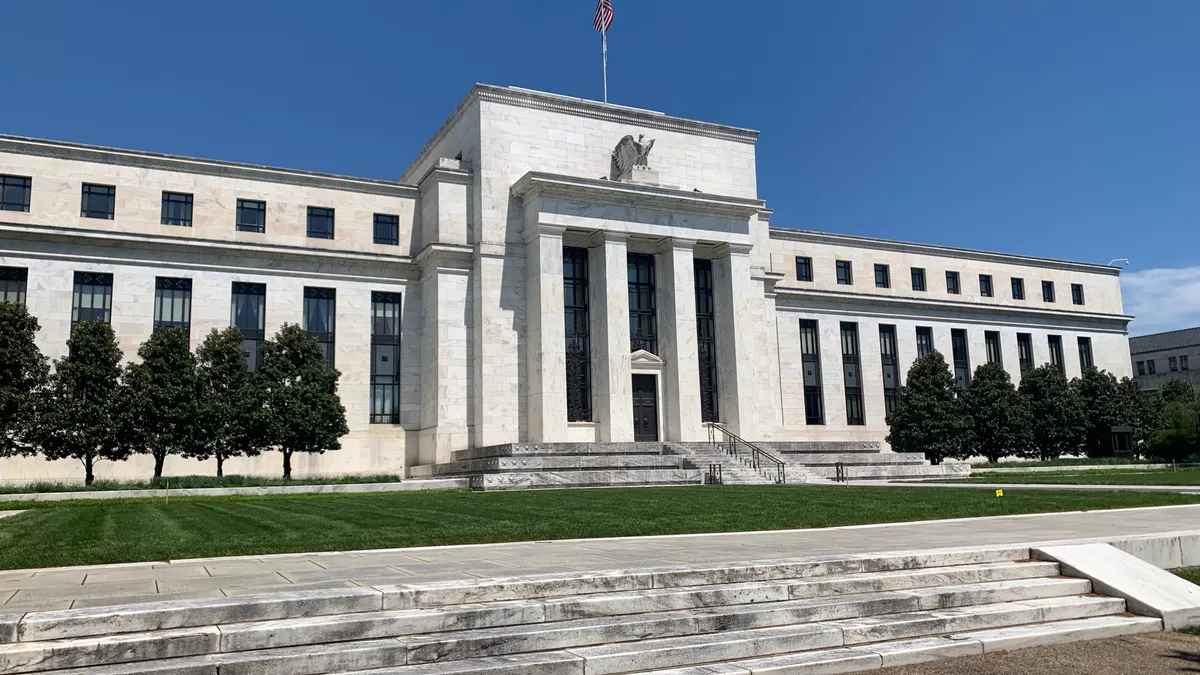Atlanta Fed President Raphael Bostic said Friday he improperly disclosed financial transactions dating back to 2017 — the year he took his current role — because he misunderstood trading restrictions and wanted to avoid perceived conflict of interest by holding his assets in managed accounts he could not direct.
Amended disclosures filed Friday included dozens of previously unreported sales or purchases of mutual funds and other investment types. More than 150 of the newly revealed transactions had been settled on dates within blackout periods before and after Fed policy meetings.
Specifically, a number of trades came during March and April 2020, as the Fed made several market adjustments in response to the then-burgeoning COVID-19 pandemic.
Bostic’s retirement account bought small amounts of various index funds on March 19 of that year, as asset prices slumped. The Fed launched a market rescue four days later. Bostic’s account sold out of several other funds and bought into several more a day after that.
Some transactions came after the Federal Reserve’s board on March 23 warned ethics offices at the central bank’s regional satellites to avoid unnecessary trading. Other moves came April 8, a day before another wide-ranging market intervention by the Fed.
Bostic’s transactions did not include individual securities. But the Atlanta Fed chief held more than $50,000 in Treasury securities last year, exceeding the limit placed on central bank officials at the time.
Fed Chair Jerome Powell has asked the central bank’s inspector general to review Bostic’s disclosures, a Fed spokesperson said.
“We look forward to the results of their work and will accept and take appropriate actions based on their findings,” the spokesperson said.
In a seven-page letter issued Friday, Bostic said he “was unaware of any specific trades or their timing,” and worked with the Atlanta Fed’s general counsel’s office to correct the disclosures “as soon as I became aware that my financial reporting did not meet the expressed or implicit expectations necessary to maintain the public’s trust.”
“I recognize it is my responsibility to understand and abide by every obligation of this office,” Bostic wrote. “I want to be clear: At no time did I knowingly authorize or complete a financial transaction based on nonpublic information or with any intent to conceal or sidestep my obligations of transparent and accountable reporting.”
The Atlanta Fed’s board of directors, in a statement Friday, expressed its support for Bostic.
“After reviewing the documents and discussing these issues with President Bostic and the Atlanta Fed’s chief ethics officer, the board acknowledges the violations and accepts President Bostic’s explanation,” said Elizabeth Smith, the Atlanta Fed’s board chair. “We are satisfied with his revised financial disclosures and the changes he has made in managing his investments.”
However, Sen. Elizabeth Warren, D-MA, called Friday’s disclosure “an alarming failure by President Bostic and further evidence of the depth of the ethics problem at the Fed.”
Warren has served as an outspoken critic of the Fed’s ethics woes ever since scandal erupted in September 2021, when financial disclosure forms revealed two other now-former regional Fed presidents, Robert Kaplan of Dallas and Eric Rosengren of Boston, traded stocks in 2020 while also helping to set monetary policy. They resigned within hours of one another.
Within weeks, the Fed updated its policy to bar board governors, regional presidents and senior staff from buying individual stocks, holding investments in individual bonds or agency-backed securities, or entering into derivatives. Additionally, policymakers and senior staff must give 45 days’ notice before buying or selling any allowed securities, must gain approval for those transactions, and must hold any investments for at least a year. “Further, no purchases or sales will be allowed during periods of heightened financial market stress,” the Fed said. Those restrictions went into effect in May.
But the scandal deepened when an amended disclosure filed in December revealed then-Fed Vice Chair Richard Clarida sold an exchange-traded fund as markets cratered in the run-up to the COVID-19 crisis, then re-bought that fund three days later. Clarida resigned in January. An inspector general probe into his and Powell’s disclosures cleared the two of wrongdoing.
The Fed inspector general’s review of Kaplan and Rosengren’s disclosures is still ongoing.
Bostic, for his part, said his assets are no longer in unified managed accounts and no “automatic” investments can occur without his approval. He also divested from assets that are forbidden under updated trading rules.
Bostic, in his statement, said he thought “having funds in managed accounts … would distance and protect me from decisions associated with the management of my financial assets.”
Additionally, using a third-party tax preparer and not actively monitoring trades “advanced my goal of eliminating the possibility that I would inadvertently use or be seen as using nonpublic information to strategically direct my investments,” he said.
"I sincerely regret if my actions raise questions about my standards, behavior or motivation, the Federal Reserve Bank of Atlanta's systems and processes to maintain the public trust, or the commitment of the Federal Reserve to transparency and accountability in fulfilling its mission," Bostic said.





















